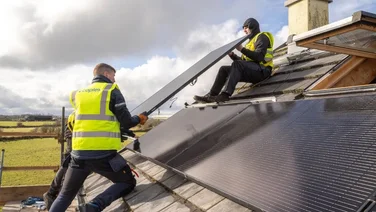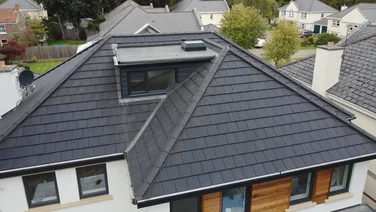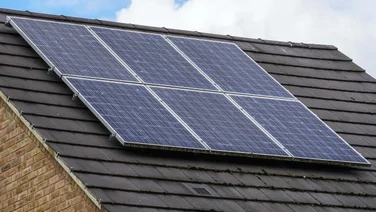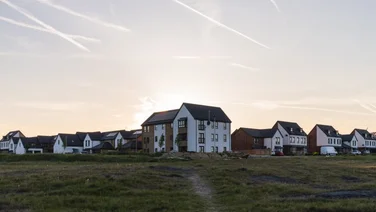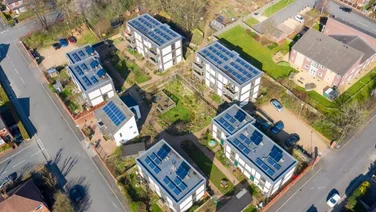✔ Solar panels in Northern Ireland will typically save you £513 per year
✔ The average three-bedroom home will make £7,841 of profit over 25 years
✔ You can cut your carbon footprint by 13%
The cost of solar panels is falling, showing the way to a bright, sunny future for Northern Ireland.
The average household will save £513 per year with solar panels, meaning you’ll take a little over nine years to break even – leaving you with 15 years or more of pure profit. Northern Ireland residents, at present, have no government grants available, however, they do benefit from 0% VAT.
And if you’re worried about the sunshine here, don’t be: Northern Ireland receives just 5% less than the UK average, so you’re still well-positioned to cut your bills.
We’ve gone into more detail below – and if you want to go solar at any point, you can compare solar panel prices with our help. All you have to do is provide a few quick details, and our expert installers will be in touch with free quotes for you to compare.
Where do you want to install solar panels?
Get startedAdvantages of solar panels in Northern Ireland: Overview
Break-even point | Net profit after 25 years | Annual electricity bill savings | CO2 saved per year |
|---|---|---|---|
9.74 years | £5,006 | £513 | 0.45 tonnes |
Figures for the average three-bedroom house
How much do solar panels cost in Northern Ireland?
Solar panels in Northern Ireland cost £500 per 350-watt solar panel, on average.
That means a system with 10 of these panels – which adds up to the 3.5 kWp (kilowatt peak) the average three-bedroom house needs – will cost £5,006.
This solar panel system will cut your energy bills by £513 per year, according to our calculations, allowing you to break even after 9.7 years – and solar panels usually last for at least 15 more years after that point.
You’ll save money by using less electricity from the grid, and by selling any solar power you don’t use to Action Renewables.
| House size | No. of panels needed | Cost | Tonnes of CO2 saved / year | Savings / year | Years to break even |
|---|---|---|---|---|---|
1-2 bedrooms | 6 | £3,004 | 0.27 | £308 | 9.7 |
3 bedrooms | 10 | £5,006 | 0.45 | £514 | 9.7 |
4+ bedrooms | 14 | £7,009 | 0.64 | £719 | 9.7 |
Do solar panels work in Northern Irish weather?
Yes, solar panels absolutely work in Northern Irish weather. In fact, the country has good conditions for solar panels.
The main danger to panels’ efficiency is overheating, which is unlikely in Northern Ireland.
And they work best in cooler climates, which is perfect.
Don’t worry if it’s cloudy, either. Solar panels will still convert light into energy on overcast days; they’ll just absorb more when it’s sunny.
In the UK, only Scotland gets less annual sunshine than Northern Ireland – and yet, due to the high price of electricity, a solar array is still more than worth the investment.
Are solar panels worth getting in Northern Ireland?
Solar panels are definitely worth getting in Northern Ireland.
Going solar allows you to cut your bills by £514 per year, typically – meaning the average home will break even in just 9.7 years.
Overall, a three-bedroom household with typical energy usage will make a total profit of £7,841 on solar panels after 25 years – all while fighting climate change.
You’ll shrink your total carbon footprint by 13% with solar panels, on average, and also help prevent power cuts.
Where do you want to install solar panels?
Get startedHow many people have solar panels in Northern Ireland?
There are 27,676 homes with solar panels in Northern Ireland, according to the Microgeneration Certification Scheme (MCS).
And solar power is only getting more popular.
The Northern Irish government’s Energy in Northern Ireland 2020 report shows that the country’s solar capacity has significantly increased every year since 2008.
In 2008, there were just seven solar panel sites in the country, so the rise of solar power has clearly been rapid.
Government grants for solar panels in Northern Ireland
Unfortunately, there are currently no government grants in Northern Ireland for solar panels.
However, make sure to contact NI Energy Advice to see if there are any grants in your area for communities that want to go solar.
There may be grants available in your area for communities wanting to install
In the past, the government forced suppliers to buy green energy from domestic solar panel owners, because the Northern Ireland Renewables Obligation legally compelled them to supply a certain amount of renewable energy alongside the rest of their energy production.
However, though the law still exists, the scheme stopped accepting new applicants on 31st March 2017.
Does the Smart Export Guarantee apply to Northern Ireland?
The Smart Export Guarantee doesn’t exist in Northern Ireland.
Since 2020, this government initiative has forced large energy suppliers to pay households for any renewable energy they export to the National Grid, with companies paying as much as 24p per kWh.
Unfortunately though, the scheme only applies to England, Scotland, and Wales – not Northern Ireland.

Is there any way to get paid for your surplus solar energy?
Yes, you can get paid for your excess solar power.
However, as suppliers in Northern Ireland aren’t legally compelled to do this under the Smart Export Guarantee, most have chosen not to.
But there is still one. You can sell your surplus solar energy to Power NI, which pays 17.66p per kWh.
You can also use Action Renewables, a registered charity that acts as an agent by taking your excess energy and selling it to suppliers looking to fulfil their renewable energy quotas.
The charity’s head of projects Mark Compston told The Eco Experts: “This year we will be paying our clients at least 18p
[per kWh]
.”
This price level is significantly higher than Smart Export Guarantee payments to the rest of the UK, which usually hover around 5p per kWh.
Budget Energy, Click Energy, and Electric Ireland have all confirmed to The Eco Experts that they do not currently pay for domestic customers’ solar energy, and we’re not aware of any other Northern Irish energy company that does.
Next steps
Assess your home and your energy usage, and consider how much energy and money you’d save with solar panels.
If you can afford the outlay, it will almost certainly be worth it – and it could make your home more saleable, considering 65% of people told our National Home Energy Survey that they were likely to buy a house with solar panels.
If you decide that you do indeed want to buy solar panels, you can find the best deal for your home by using our free comparison tool.


